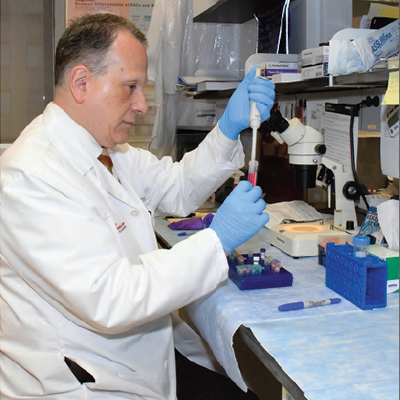First-of-Its-Kind Gene Therapy Trials for Dry AMD
Dr. Tongalp Tezel
The Department of Ophthalmology at NewYork-Presbyterian/Columbia University Irving Medical Center is one of the leading programs in the United States conducting a groundbreaking phase 2 clinical trial of an investigational gene therapy for dry age-related macular degeneration (AMD), the most common cause of blindness in the industrialized world.
An estimated 11 million individuals in the United States and more than 190 million people worldwide have macular degeneration. The vast majority of patients are 65 or older and have the dry form of the disease, which slowly causes irreversible vision loss. In the most advanced stage of dry AMD, geographic atrophy, entire areas of photoreceptor cells die, leaving dark grayish patches in the central vision. Apart from the AREDS formula of vitamins and anti-oxidants, which marginally slow down this degenerative process, there are currently no FDA-approved treatment options for the disease.
“Vision loss has a tremendous impact on the lives of patients and their families,” says Tongalp Tezel, MD, Director of the Vitreoretinal Service at Columbia and principal investigator of the trial here. “Any treatment that can slow or stop the progression of this disease would be immensely valuable to patients, many of whom continue to lead active lives well into their 80s or 90s.”
In 2005, a team of scientists led by Rando Allikmets, PhD, the William and Donna Acquavella Professor of Ophthalmic Sciences (in Ophthalmology and Pathology and Cell Biology) at Columbia, was among the first to discover that a variation in a gene that makes one of the complement proteins triggers macular degeneration through an immune reaction that kills retinal cells.
Building on this discovery, the investigational gene therapy (GT005) now being studied uses a genetically modified viral vector to deliver DNA that encodes for complement factor I (CFI), a protein that prevents the immune system from attacking cells in the retina. GT005, which is given as a single, one-time surgical injection underneath the retina, has received fast-track designation from the FDA for the treatment of geographic atrophy secondary to dry age-related macular degeneration.
“Gene therapies for other eye diseases exist, but the trial is the first to test the safety and effectiveness of a gene therapy for dry macular degeneration,” explains Dr. Tezel. “This new gene therapy targets one of the defective complement proteins called CFI and aims to correct this gene’s loss of function by making retinal cells express the correct copy of the molecule and suppress the inflammation so that the body does not attack its own retinal cells.”
Columbia’s first patient in the trial, and the first in the tri-state area, received the gene therapy injection in December 2020. A total of 75 participants will be recruited, divided into three groups: 25 controls who will not receive gene therapy, 25 patients who will receive a lower dose of the corrective gene therapy, and 25 patients who will receive a higher dose. Study participants will be followed for up to a year to determine if the therapy can slow the progression of geographic atrophy and be monitored for side effects.
“The early surgeries have gone well,” notes Dr. Tezel. “We are very optimistic and so pleased to be taking a leading role in this study. It is true precision medicine.” Dr. Tezel and his colleagues will also soon begin gene therapy trials for wet macular degeneration.
For More Information
To learn more about enrollment for the the GT005 clinical trial, email [email protected] or call 212-342-4586.




